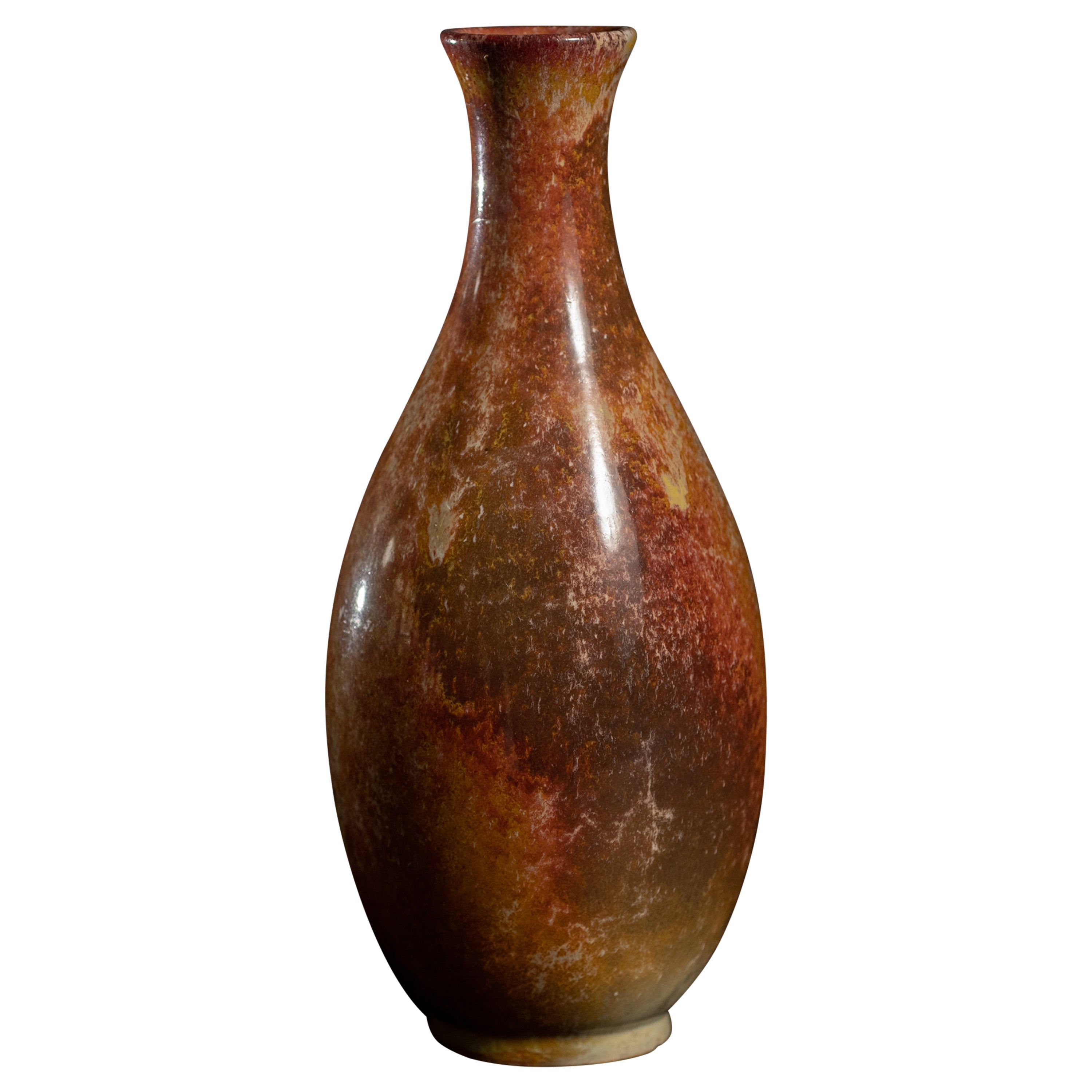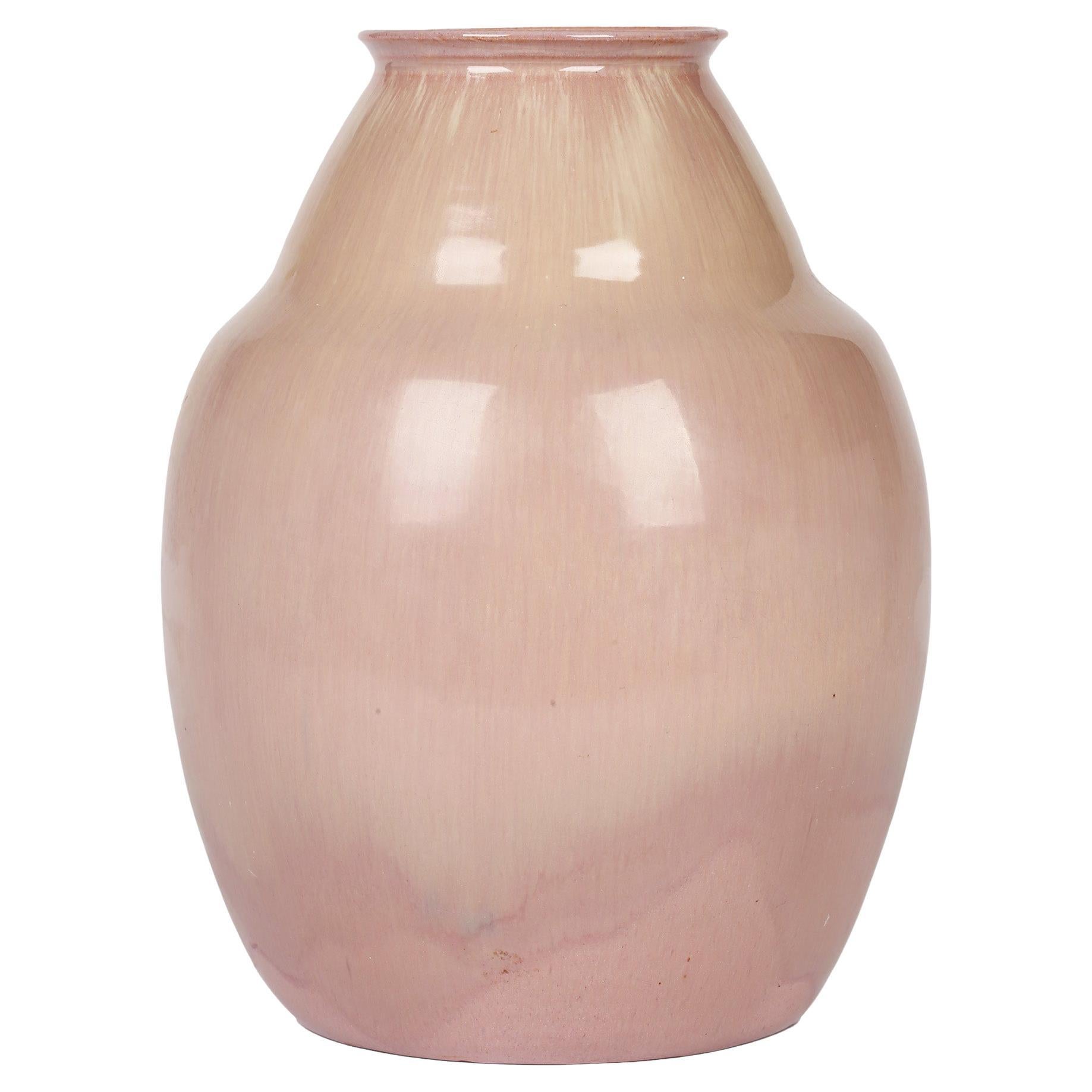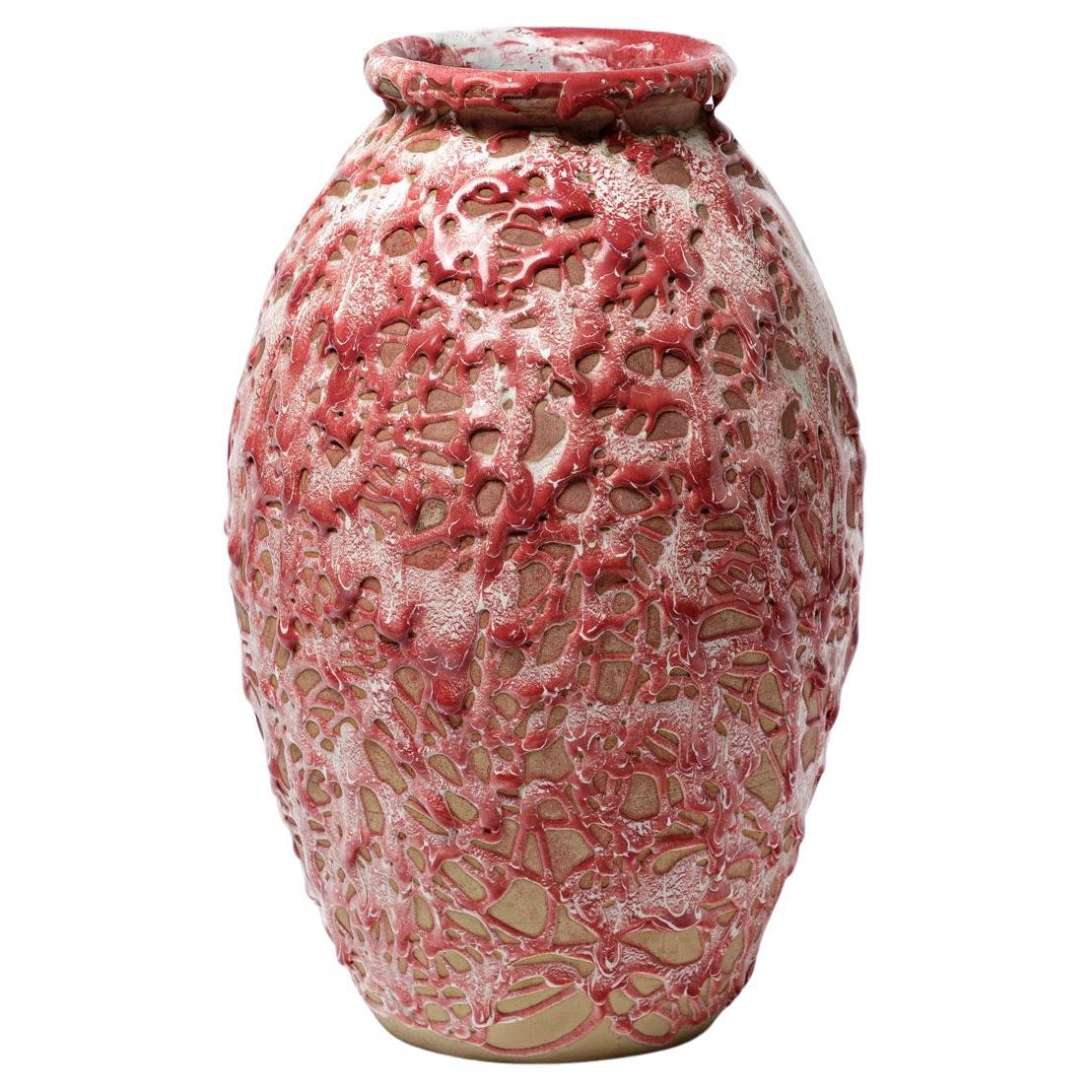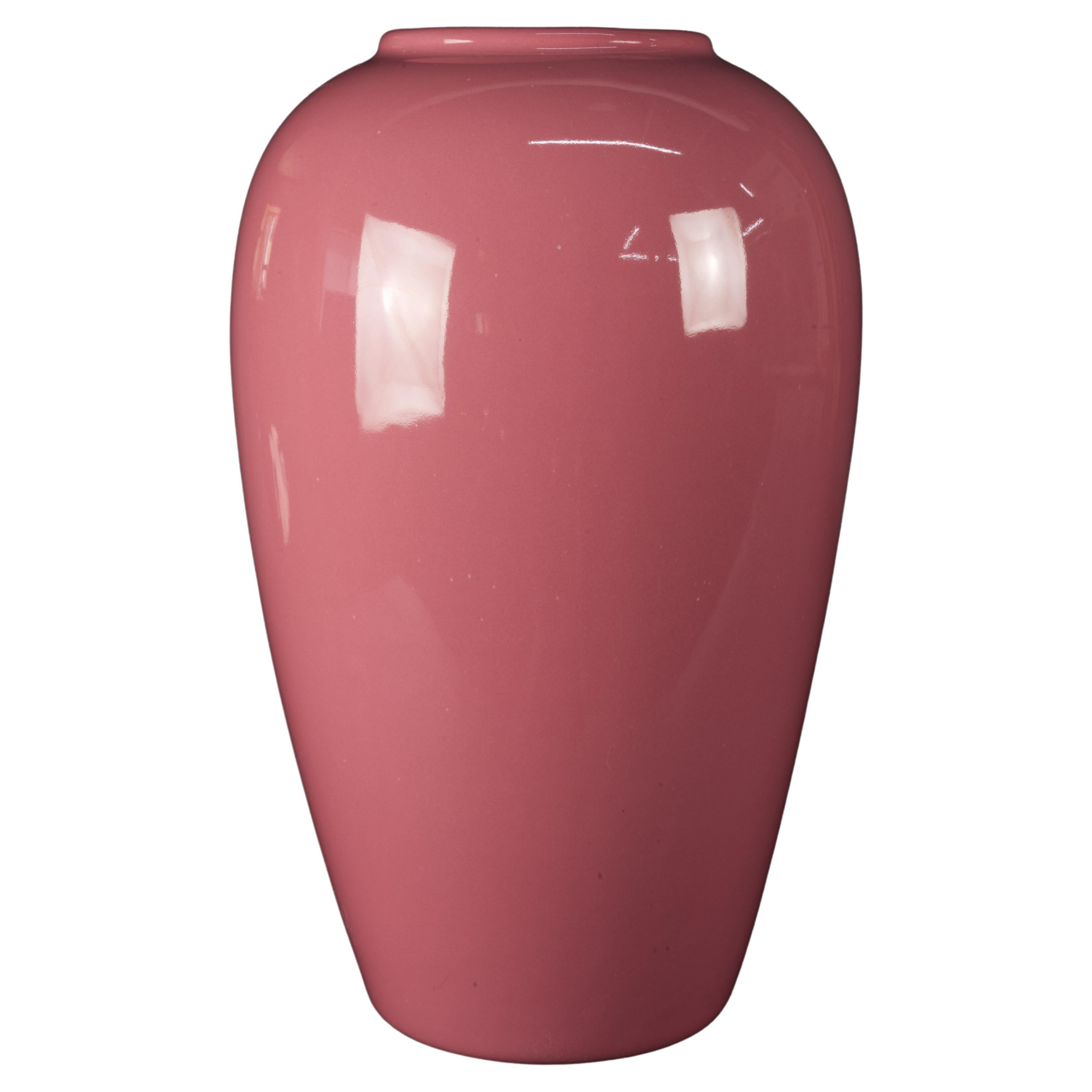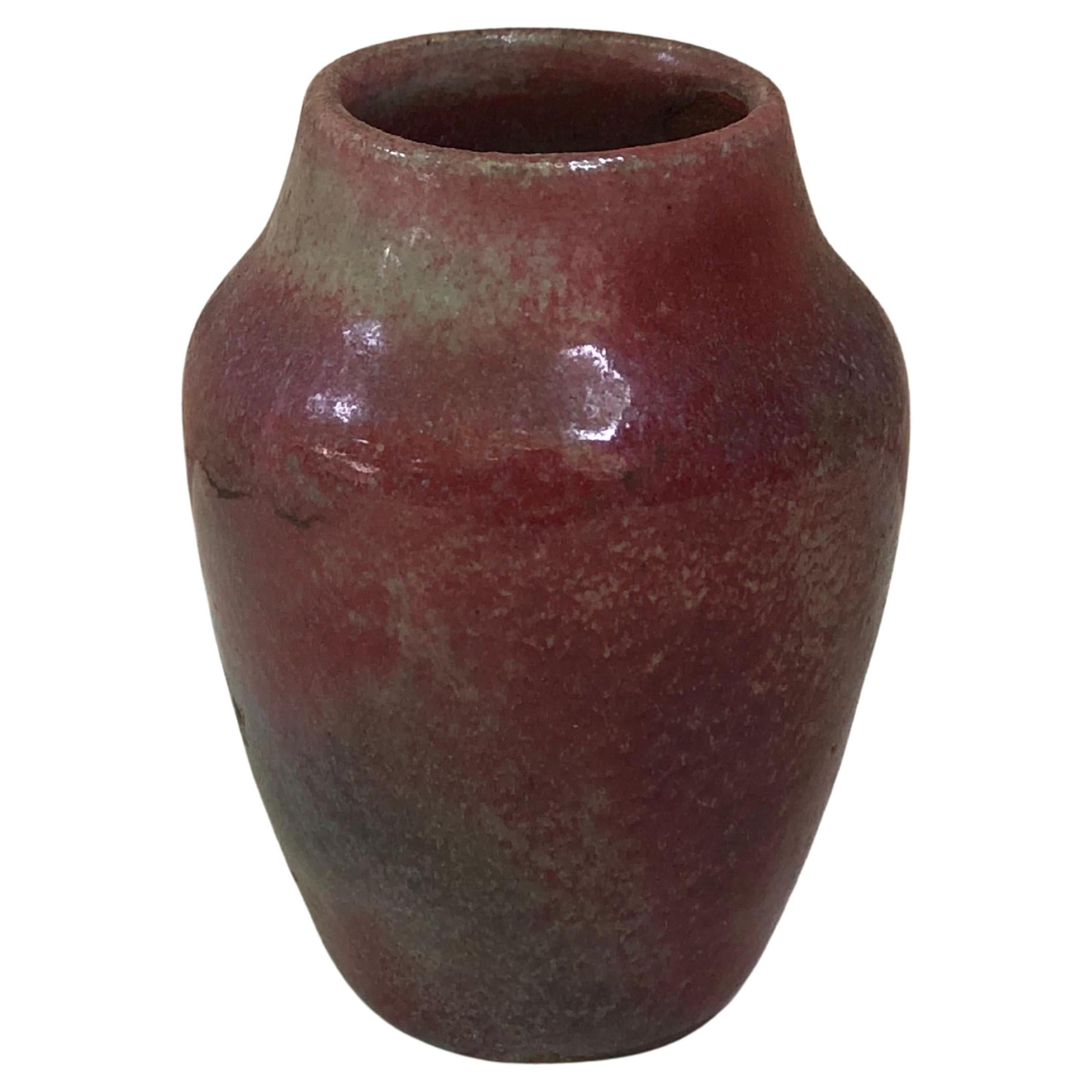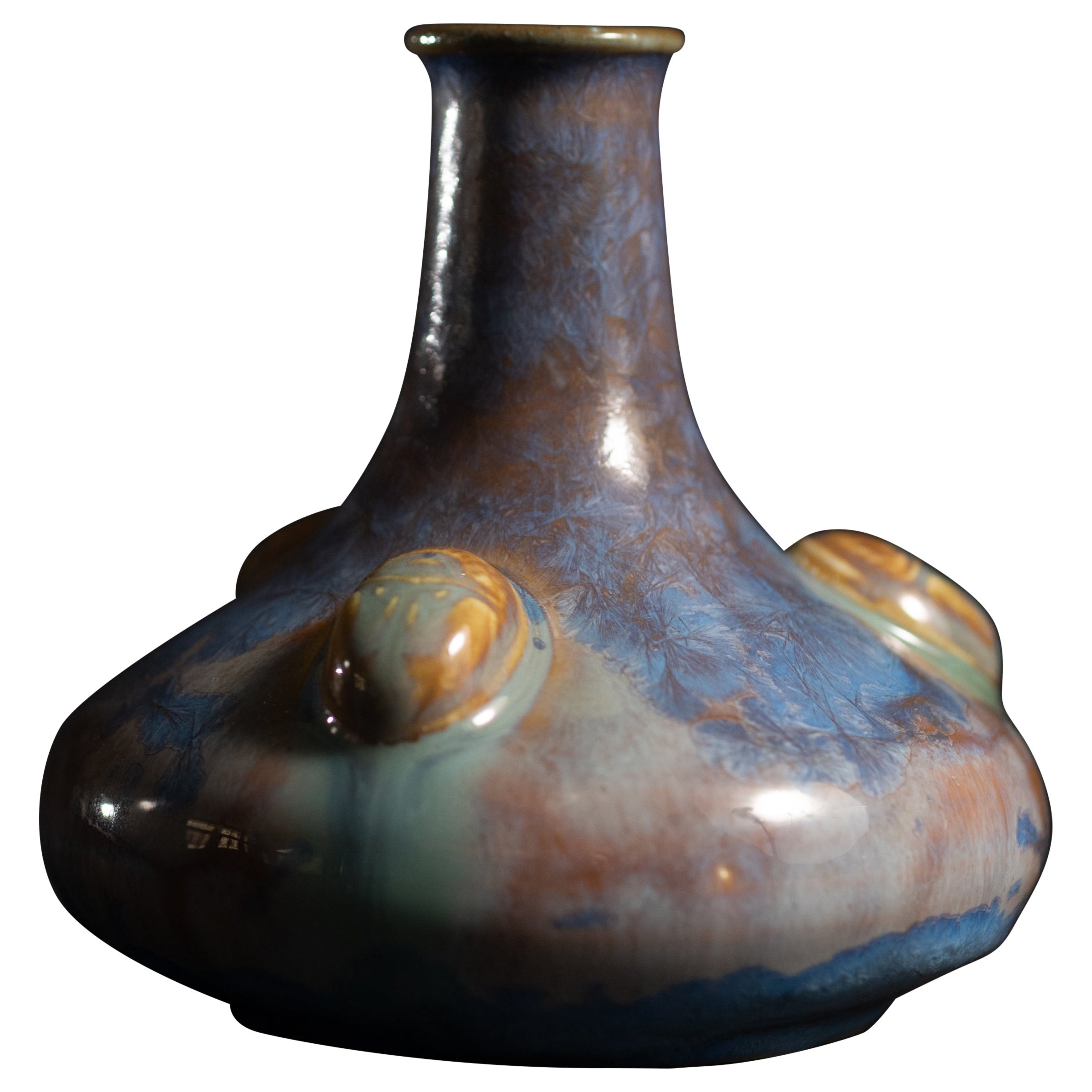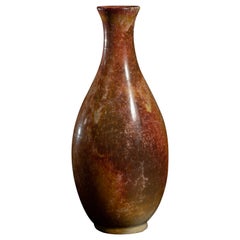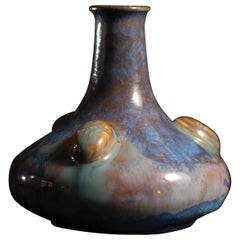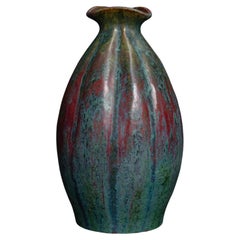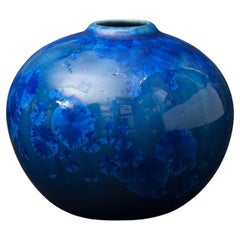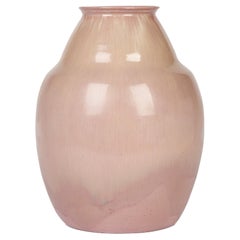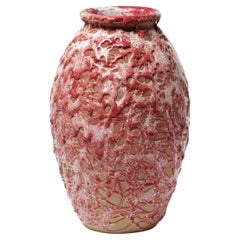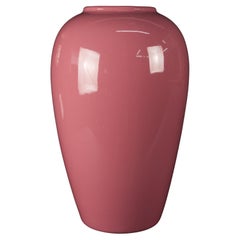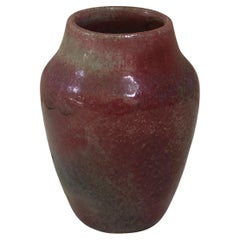Items Similar to Arts & Crafts Blush Vase by Adelaide Alsop Robineau for University City
Want more images or videos?
Request additional images or videos from the seller
1 of 6
Arts & Crafts Blush Vase by Adelaide Alsop Robineau for University City
$9,800
£7,390.17
€8,547.09
CA$13,749.35
A$15,283.25
CHF 8,011.15
MX$186,645.51
NOK 100,014.64
SEK 94,095.12
DKK 63,792.99
About the Item
“A Robineau vase is a true work of art, unique in conception and perfect in execution, for every piece that left this studio was a labor of love.” – Ethel Brand Wise, The American Magazine of Art, 1929
Adelaide Alsop Robineau was a pioneer in American studio ceramics and excelled as an innovator in pottery both technically and aesthetically. As a young woman of high society in the late Victorian era, she gained early accolades as a skilled watercolorist and china painter and taught for a time at St. Mary’s Hall in Minnesota. In 1899, she married Samuel E. Robineau, a French gentleman and collector of Chinese ceramics. He was deeply intrigued by her talent and steadfastly supported and encouraged her throughout her career. The couple collaborated to produce a popular and influential monthly journal together, Keramic Studio, and went on to build a studio on their property in Syracuse, New York, which they named Four Winds. Robineau would also go on to teach for many years at Syracuse University while creating her own work and raising three children.
Early in her career, she studied at Alfred University under Charles Binns, who is widely considered to be the progenitor of contemporary studio ceramics in America. His program established a shift in the craft of ceramics as an academic pursuit, rather than one of apprenticeship. Pottery throwers and the artists who decorated the wares traditionally inhabited separate roles in ceramic manufacture, a practice common in Europe. Binns’ philosophy merged the two, such that the potter had total agency of the final product. This marked a historic divergence in the creation of art pottery – one that Adelaide Robineau fully embraced. Indeed, she became one of the first ceramists, and one of the first women, to throw her own pots.
Robineau was greatly inspired by the work and writings of Taxile Doat of Sèvres, France. As she began experimenting with clays and the high temperature method known as Grand Feu, she went from working in stoneware to porcelain. Porcelain is a notoriously technically difficult enterprise for even the simplest of pieces, and she added further complexity to the process by intricately carving many of her works, making them even more difficult to fire. The porcelain-making process was so volatile, in fact, that many of her pieces would burst in the kiln. Ever the tireless and determined innovator, she experimented with and invented many new glazes. She was, in fact, the first American ceramist to apply colored glazes to porcelain.
The period between 1909 and 1911 marks an important time in Robineau’s career when she made some of her most exceptional work. Joining other influential potters of the time such as Taxile Doat, Frederick H. Rhead, and Emile Diffloth, she was part of an impressive roster of artists working and teaching at the University City Pottery and Art Institute in Missouri. During this time, she produced what is widely considered her life’s masterpiece, the Scarab Vase – a veritable White Whale of early American ceramics – which was purchased from her husband in 1930 by the Everson Museum of Art in Syracuse, New York. This seventeen-inch tall, intricately carved magnum opus, complete with a stand and lid, took her 1,000 hours to carve, leading her to dub it The Apotheosis of the Toiler. It won her the esteemed Grand Prize in Ceramics at the 1911 International Exposition in Turin, Italy.
Robineau would go on to win several highly sought-after prizes throughout her career, and she garnered almost unanimous praise from critics, collectors, and admirers alike. At the 1915 Panama Pacific International Exposition, Helen Keller handled some of her pieces, and she was reported to have said of one with a wisteria motif: “Seven times fired in the furnace and not found wanting.” Her work was the first of the Metropolitan Museum of Art’s purchases when it began collecting American contemporary ceramics in 1922. In 1928, the year before her passing, several of her creations were represented in their International Exhibition of Ceramic Art and in 1929, after her death, she became the first ceramist honored with a retrospective exhibition there.
An artist of many firsts, Adelaide Robineau, through her passion, perseverance, and insight, left an indelible mark in the world of American ceramics. Widely recognized as a leader in her field, she left a celebrated legacy and continues to inspire collectors and potters worldwide.
- Rago
- Creator:Adelaide Alsop Robineau (Artist)
- Dimensions:Height: 3 in (7.62 cm)Width: 2 in (5.08 cm)Depth: 2 in (5.08 cm)
- Style:Arts and Crafts (Of the Period)
- Materials and Techniques:Porcelain,Glazed
- Place of Origin:
- Period:1910-1919
- Date of Manufacture:c. 1910
- Condition:
- Seller Location:Chicago, US
- Reference Number:1stDibs: LU7300238310202
About the Seller
5.0
Vetted Professional Seller
Every seller passes strict standards for authenticity and reliability
1stDibs seller since 2022
18 sales on 1stDibs
Typical response time: 9 hours
- ShippingRetrieving quote...Shipping from: Chicago, US
- Return Policy
Authenticity Guarantee
In the unlikely event there’s an issue with an item’s authenticity, contact us within 1 year for a full refund. DetailsMoney-Back Guarantee
If your item is not as described, is damaged in transit, or does not arrive, contact us within 7 days for a full refund. Details24-Hour Cancellation
You have a 24-hour grace period in which to reconsider your purchase, with no questions asked.Vetted Professional Sellers
Our world-class sellers must adhere to strict standards for service and quality, maintaining the integrity of our listings.Price-Match Guarantee
If you find that a seller listed the same item for a lower price elsewhere, we’ll match it.Trusted Global Delivery
Our best-in-class carrier network provides specialized shipping options worldwide, including custom delivery.More From This Seller
View AllArts & Crafts Ochre Vase by Adelaide Alsop Robineau
By Adelaide Alsop Robineau
Located in Chicago, US
Note: We highly recommend shipping through 1stDibs for its cost effectiveness, full insurance coverage, and reliable handling. While standard parcel services are an option, the default quote does not include packing and insurance. 1stDibs shipping provides a level of value, protection, and care that aligns with our commitment to safeguarding historic artworks and providing excellent client service.
“A Robineau vase is a true work of art, unique in conception and perfect in execution, for every piece that left this studio was a labor of love.” – Ethel Brand Wise, The American Magazine of Art, 1929
Adelaide Alsop Robineau was a pioneer in American studio ceramics and excelled as an innovator in pottery both technically and aesthetically. As a young woman of high society in the late Victorian era, she gained early accolades as a skilled watercolorist and china painter and taught for a time at St. Mary’s Hall in Minnesota. In 1899, she married Samuel E. Robineau, a French gentleman and collector of Chinese ceramics. He was deeply intrigued by her talent and steadfastly supported and encouraged her throughout her career. The couple collaborated to produce a popular and influential monthly journal together, Keramic Studio, and went on to build a studio on their property in Syracuse, New York, which they named Four Winds. Robineau would also go on to teach for many years at Syracuse University while creating her own work and raising three children.
Early in her career, she studied at Alfred University under Charles Binns, who is widely considered to be the progenitor of contemporary studio ceramics in America. His program established a shift in the craft of ceramics as an academic pursuit, rather than one of apprenticeship. Pottery throwers and the artists who decorated the wares traditionally inhabited separate roles in ceramic manufacture, a practice common in Europe. Binns’ philosophy merged the two, such that the potter had total agency of the final product. This marked a historic divergence in the creation of art pottery – one that Adelaide Robineau...
Category
Vintage 1910s American Arts and Crafts Vases
Materials
Porcelain
Arts & Crafts Scarab Vase by Adelaide Alsop Robineau
By Adelaide Alsop Robineau
Located in Chicago, US
Note: We highly recommend shipping through 1stDibs for its cost effectiveness, full insurance coverage, and reliable handling. While standard parcel services are an option, the default quote does not include packing and insurance. 1stDibs shipping provides a level of value, protection, and care that aligns with our commitment to safeguarding historic artworks and providing excellent client service.
“A Robineau vase is a true work of art, unique in conception and perfect in execution, for every piece that left this studio was a labor of love.” – Ethel Brand Wise, The American Magazine of Art, 1929
Adelaide Alsop Robineau was a pioneer in American studio ceramics and excelled as an innovator in pottery both technically and aesthetically. As a young woman of high society in the late Victorian era, she gained early accolades as a skilled watercolorist and china painter and taught for a time at St. Mary’s Hall in Minnesota. In 1899, she married Samuel E. Robineau, a French gentleman and collector of Chinese ceramics. He was deeply intrigued by her talent and steadfastly supported and encouraged her throughout her career. The couple collaborated to produce a popular and influential monthly journal together, Keramic Studio, and went on to build a studio on their property in Syracuse, New York, which they named Four Winds. Robineau would also go on to teach for many years at Syracuse University while creating her own work and raising three children.
Early in her career, she studied at Alfred University under Charles Binns, who is widely considered to be the progenitor of contemporary studio ceramics in America. His program established a shift in the craft of ceramics as an academic pursuit, rather than one of apprenticeship. Pottery throwers and the artists who decorated the wares traditionally inhabited separate roles in ceramic manufacture, a practice common in Europe. Binns’ philosophy merged the two, such that the potter had total agency of the final product. This marked a historic divergence in the creation of art pottery – one that Adelaide Robineau...
Category
Vintage 1910s American Arts and Crafts Vases
Materials
Porcelain
Art Nouveau Stoneware Gourd Vase Pierre-Adrien Dalpayrat
By Pierre-Adrien Dalpayrat
Located in Chicago, US
PIERRE-ADRIEN DALPAYRAT (1844-1910) After working nearly half his life as an itinerant faience painter and directing production for commercial porcelain manufacturers, Dalpayrat’s ey...
Category
Vintage 1910s French Art Nouveau Vases
Materials
Stoneware
Arts & Crafts Crystalline Cerulean Vase by Adelaide Alsop Robineau
By Adelaide Alsop Robineau
Located in Chicago, US
Note: We highly recommend shipping through 1stDibs for its cost effectiveness, full insurance coverage, and reliable handling. While standard parcel services are an option, the default quote does not include packing and insurance. 1stDibs shipping provides a level of value, protection, and care that aligns with our commitment to safeguarding historic artworks and providing excellent client service.
“A Robineau vase is a true work of art, unique in conception and perfect in execution, for every piece that left this studio was a labor of love.” – Ethel Brand Wise, The American Magazine of Art, 1929
Adelaide Alsop Robineau was a pioneer in American studio ceramics and excelled as an innovator in pottery both technically and aesthetically. As a young woman of high society in the late Victorian era, she gained early accolades as a skilled watercolorist and china painter and taught for a time at St. Mary’s Hall in Minnesota. In 1899, she married Samuel E. Robineau, a French gentleman and collector of Chinese ceramics. He was deeply intrigued by her talent and steadfastly supported and encouraged her throughout her career. The couple collaborated to produce a popular and influential monthly journal together, Keramic Studio, and went on to build a studio on their property in Syracuse, New York, which they named Four Winds. Robineau would also go on to teach for many years at Syracuse University while creating her own work and raising three children.
Early in her career, she studied at Alfred University under Charles Binns, who is widely considered to be the progenitor of contemporary studio ceramics in America. His program established a shift in the craft of ceramics as an academic pursuit, rather than one of apprenticeship. Pottery throwers and the artists who decorated the wares traditionally inhabited separate roles in ceramic manufacture, a practice common in Europe. Binns’ philosophy merged the two, such that the potter had total agency of the final product. This marked a historic divergence in the creation of art pottery – one that Adelaide Robineau...
Category
Vintage 1910s American Arts and Crafts Vases
Materials
Porcelain
Art Nouveau Porcelain Vase by Taxile Doat for Manufacture Nationale de Sèvres
By Taxile Doat, Manufacture Nationale de Sèvres
Located in Chicago, US
Note: We highly recommend shipping through 1stDibs for its cost effectiveness, full insurance coverage, and reliable handling. While standard parcel services are an option, the defau...
Category
Antique Early 1900s French Art Nouveau Vases
Materials
Porcelain
Art Deco Cylindrical Stoneware Vase by Émile Decoeur
By Émile Decoeur
Located in Chicago, US
A master of 20th century ceramics, Émile Decoeur may be best known for his impact upon the Art Deco style. Quiet, pure and serene, Decoeur strikes a perfect harmony of form and glaze...
Category
Vintage 1930s French Art Deco Vases
Materials
Stoneware
You May Also Like
Willem Brouwer Dutch Art Deco Streak Glazed Art Pottery Vase
Located in Bishop's Stortford, Hertfordshire
A large and attractive Dutch Art Deco vase decorated in pink streaked glazes by Willem Brouwer and made between 1920 and 1930. The vase is made in terracotta clay and is of rounded b...
Category
Vintage 1920s Dutch Art Deco Vases
Materials
Terracotta
A ceramic vase with pink glaze decoration, circa 1930 attributed to CAB.
By Ceramique d'Art de Bordeaux
Located in Saint-Ouen, FR
A ceramic vase with pink and white glaze decoration attributed to " Céramique d 'Art de Bordeaux".
Stamp signature under the base.
Perfect original signature.
Circa 1930.
Category
20th Century French Art Deco Vases
Materials
Ceramic
Royal Haeger Large Mauve Pink Vase
By Royal Haeger
Located in Clifton Springs, NY
Royal Haeger mauve pink vase has graceful, traditional shape and monochromatic semi-glossy glaze. This large size, minimalistic vase will look great on its own or paired with other ...
Category
Late 20th Century American Minimalist Vases
Materials
Ceramic, Pottery
Small Art Deco Pottery Vase Auguste Delaherche, Circa 1930
By Auguste Delaherche
Located in Austin, TX
Art Deco pottery vase signed Auguste Delaherche Circa 1930.
Number 028.
Category
Vintage 1930s French Japonisme Vases
Materials
Pottery
Upsala Ekeby, Vase, Earthenware, Sweden, 1930s
By Upsala Ekeby
Located in High Point, NC
A beige and orange-glazed incised earthenware vase designed and produced by Upsala Ekeby, Sweden, 1930s.
Category
Vintage 1930s Swedish Scandinavian Modern Vases
Materials
Earthenware
Art Deco Pottery Pink Vase Attributed to Jacques Lenoble French Ceramic Vase
By Jacques Lenoble
Located in Neuilly-en- sancerre, FR
Attributed to Jacques Lenoble
Elegant ceramic vase with pink ceramic glaze color.
Beautiful handmade form typical from the 1930s.
Signed J under the base.
Dimensions: 34 ...
Category
Mid-20th Century French Art Deco Vases
Materials
Pottery
More Ways To Browse
French Arts And Crafts
Antique Clay Pottery Vases
White Sevres Vases
French Ceramic Tall Vase
Antique Italian Porcelain Vases
Keller Dining
Antique American Glaze Pottery
Carved Scarab
Italian Ceramic Vase 1930
Sevres China
Antique Stoneware Pot
Antique Stoneware Pots
Chinese Pots With Lids
Grand Feu
Victorian Pot Lids
Porcelain Chinese Woman
Charles Brown Pottery
Tall Magazine Stand
